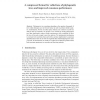Free Online Productivity Tools
i2Speak
i2Symbol
i2OCR
iTex2Img
iWeb2Print
iWeb2Shot
i2Type
iPdf2Split
iPdf2Merge
i2Bopomofo
i2Arabic
i2Style
i2Image
i2PDF
iLatex2Rtf
Sci2ools
107
click to vote
WABI
2005
Springer
2005
Springer
A Compressed Format for Collections of Phylogenetic Trees and Improved Consensus Performance
Phylogenetic tree searching algorithms often produce thousands of trees which biologists save in Newick format in order to perform further analysis. Unfortunately, Newick is neither space efficient, nor conducive to post-tree analysis such as consensus. We propose a new format for storing phylogenetic trees that significantly reduces storage requirements while continuing to allow the trees to be used as input to post-tree analysis. We implemented mechanisms to read and write such data from and to files, and also implemented a consensus algorithm that is faster by an order of magnitude than standard phylogenetic analysis tools. We demonstrate our results on a collection of data files produced from both maximum parsimony tree searches and Bayesian methods.
| Added | 28 Jun 2010 |
| Updated | 28 Jun 2010 |
| Type | Conference |
| Year | 2005 |
| Where | WABI |
| Authors | Robert S. Boyer, Warren A. Hunt Jr., Serita M. Nelesen |
Comments (0)

